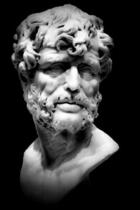
Seneca (Córdoba, 4 BC - Rome, 65 AD) was a prominent Roman philosopher, politician, orator and writer. A predominant figure in Roman politics during the reigns of Claudius and Nero, he was one of the most admired, influential and respected senators. Between the years 54 and 62, during the early years of the reign of his young pupil Nero, he de facto ruled the Roman Empire. As a writer, Seneca went down in history as one of the greatest representatives of Stoicism. His work constitutes the main written source of Stoic philosophy that has survived to the present day. He covers both plays and philosophical dialogues, treatises on natural philosophy and letters. Using an accessible style and away from technicalities, he outlined the main characteristics of late Stoicism, of which, along with Epictetus and Marcus Aurelius, he is considered the greatest exponent of it.




